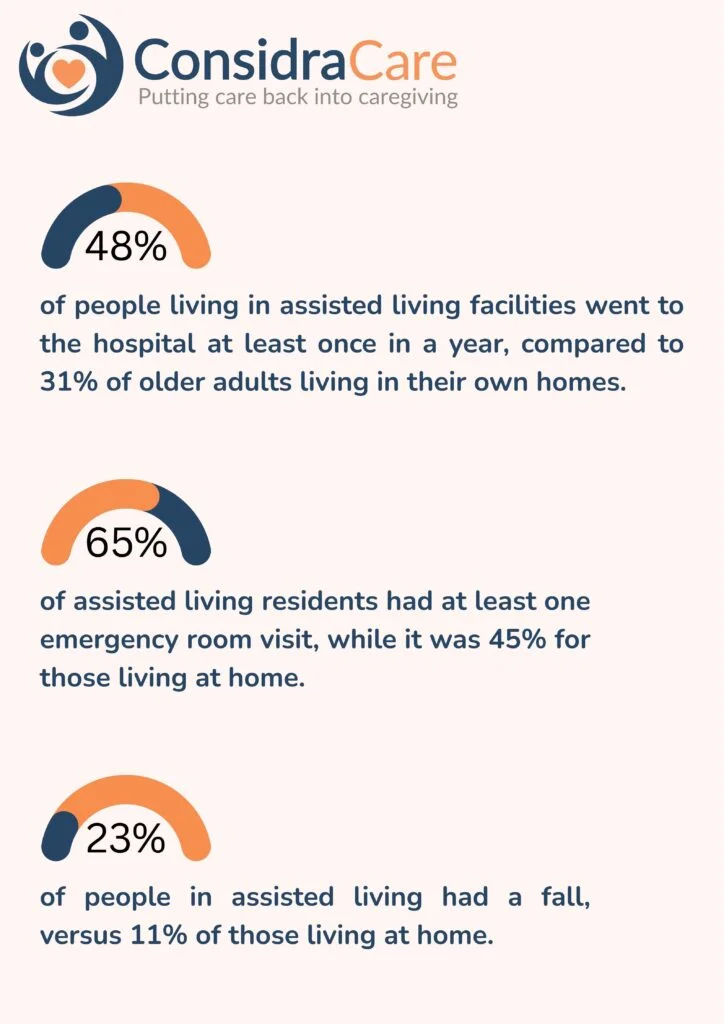In the health care industry, many services go by different names while serving similar purposes, so it’s natural to feel confused. However, staying informed and expanding your knowledge is important.
In this article, we’ll look at what private home care and community care is, how they differ, and which option might be right for your loved one.
What Is Private Home Care?
Private home care involves hiring professional caregivers to assist elders in their own homes. This type of care is typically paid for out-of-pocket or through private insurance. You can choose specific hours and the type of care needed according to your needs.
Private home care services are typically categorized into three main types, each designed to meet specific needs:
1. Companionship Care:
This service focuses on providing emotional support and social interaction for seniors who may feel isolated or lonely. Companionship caregivers engage in activities like conversation, playing games, or accompanying clients on walks, helping to enhance their quality of life.
2. Personal Care:
Personal care involves assistance with daily activities such as bathing, dressing, grooming, and meal preparation. It’s ideal for individuals who need help with routine tasks to maintain their independence at home.
3. Nursing Care:
Nursing care is provided by licensed healthcare professionals and is suitable for seniors requiring medical attention for chronic conditions, post-operative recovery, or specialized care for illnesses like dementia or Alzheimer’s disease. Services may include medication management, wound care, and health monitoring.
Read More: Caring for Elderly Parents with Alzheimer’s or Dementia: Top Caregiving Tips
What Is Community Care?
Community care refers to services provided in places like long-term care homes, nursing homes, and assisted living facilities. Whether this type of care is right for your loved one depends on their health condition and where you live.
Community care often follows a standardized approach, meaning the care provided is the same for most residents. While many people pay a significant amount for this kind of care, the experience may not always feel personalized or “like home.” The comfort and services your loved one receives will also depend on the type of accommodation you choose and how much you pay.
Private Care vs Community Care: The Differences at a Glance
Here, we’ll take a closer look at how they differ in detail.
1. Quality of Care:
The quality of care will depend on the company you choose for private home care. That’s why it’s often said to take your time when looking at your options for an in-home care provider. A good home care provider has qualified and experienced staff. They offer personalized care plans and match caregivers with your loved ones. These steps quickly improve the quality of care and, in return, enhance the quality of life for seniors in private home care.
In a community care setting, you’re not much in control. Though you can visit, having a glance alone doesn’t provide you with insights into what’s happening inside when you are gone. You don’t know how qualified the staff is. Moreover, the care provided is not personalized and can’t be adjusted according to every resident’s needs.
Here is what the study titled “Health Outcomes From Assisted Living Facilities” found out about the well-being of seniors living in assisted living facilities (ALF).
Findings of the research are as follows:

2. Consistency of Care:
In private home care, especially live-in care, the same caregiver cares for your loved one. They get to know them better, their choices and preferences regarding certain things. This makes the care process smoother and more comfortable for your loved one.
In community care, your loved one is most likely cared for by different caregivers. Caregivers don’t get a chance to understand their needs deeply or to develop a bond or meaningful connection.
3. Personalized and Flexible Care:
Your loved one gets personal attention because there’s one caregiver focusing only on them. They quickly notice any changes or any special needs they may have. Private home care is also flexible. If your loved one wants breakfast late or prefers certain routines, it’s easy to adjust the care to suit their comfort.
Flexibility and personalization are the last things community care management may think of. They have multiple residents with varying needs and choices, so they follow a set schedule for activities, and staff serve meals at a fixed time.
4. Family Involvement:
A family can stay involved at every step of the care journey, such as:
- Initial Assessments
- Qualification Screening
- Choosing the Care Provider
- Matching with the Caregiver
- Setting Personalized Care Plans
At ConsidraCare, our platform simplifies staying informed about your loved one’s health status. We keep you updated on care plans, delivery, and caregiver tasks. Our aim is to reduce stress and take much of the responsibility off families, ensuring our approach works best for your loved ones.
On the contrary, the community care settings do not inform families or give updates about their loved one’s health, even after significant events like falls or injuries. Such situations add a layer of uncertainty to community-based care options.
5. Cost of Care:
The best thing about in-home care is that you pay for exactly what your loved one needs. That way, you can adjust the budget according to your financial situation. But you pay a fixed and hefty amount to other senior care settings.
Read More: How Much Does Home Care Cost for Seniors in Ontario?
What Should be Your Choice?
Around 96% of seniors want to stay in their own homes as they grow older. As a family member, it’s important to respect this sentiment. Luckily, home care has improved significantly, becoming a preferred choice for many. Ultimately, your decision should focus on what makes your loved one happiest and healthiest, fitting comfortably within your family’s lifestyle and finances.
Get Compassionate Home Care in Ontario:
The challenges of caregiving can be demanding enough to impact both your life and your loved one’s well-being. That’s why it’s important to take the right steps at the right time.
We offer in-home care services in Ontario for loved ones who need companionship, personal care, or critical support for their medical needs. Our caregivers — including registered nurses and personal support workers (PSWs) — are trained to assist your loved one, even as their care needs change over time.
If you’re unsure how to assess your loved one’s condition or are actively searching for care options, we’re here to help.
Schedule a free assessment and speak with a care advisor today.

Final Thoughts:
Choosing care for a loved one is never easy, but it’s an important decision that deserves time, attention, and care. While community care can work for some families, private home care often gives your loved one the comfort, flexibility, and personal attention they truly need.
If staying at home feels right for them, and you want peace of mind knowing they’re in safe, caring hands, private home care in ontario could be the best choice
FAQ’s
1. Can you claim private home care on taxes?
Yes! You can claim private home care expenses on your taxes in Ontario. If you or someone you care for (like a spouse, parent, or child) needs help at home due to a physical or mental condition, and you hire someone to provide that care, you may be able to claim those costs as medical expenses on your tax return.
2. What is the difference between private and public home care?
Public home care is funded by the government and offered to eligible individuals, but it may have limited hours, wait times, and less flexibility. Private home care is paid out-of-pocket and offers personalized, flexible services with the ability to choose your caregiver and schedule.
3. How much is private home care per hour in Ontario?
Private home care in Ontario usually costs between $20 to $35 per hour. This includes help with personal care, companionship. If you need a nurse or therapist to come to your home, it usually costs $50 to $60 per visit, depending on the service.
4. Is private home care available for Alzheimer’s patients?
Yes, private home care can be provided for Alzheimer’s or dementia patients. Caregivers are trained to handle the complexities as the disease progresses. They can manage behavioral symptoms like agitation, wandering, and other signs associated with dementia. This type of care is usually personalized and supports individuals through memory loss.





